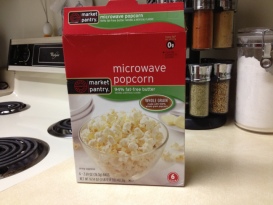So as I was enjoying my bowl (okay… bag) of lightly-buttered popcorn and M&Ms this evening and contemplating what I should blog about, I noticed an oval shape on the popcorn box bearing the words “WHOLE GRAIN”. The statement directly blow it says “Made with 100% whole grain popcorn”. Seriously? The manufacturer found it necessary to tell me that my popcorn was whole grain? What has this world come to?
Even if you aren’t directly involved in agriculture, you probably understand how popcorn works. Basically you heat up the kernel and it explodes, releasing the fluffy goodness that was trapped inside. Add some butter flavoring, salt, or M&Ms, and you’re good to go. And you use the entire popcorn kernel, right? Right.
Why is it necessary to advertise that this brand of popcorn happens to be whole grain? Popcorn wouldn’t pop if the whole grain weren’t intact! The term “whole grain” is widely used in food marketing and generally tells consumers that the product is “healthy” or “not processed”. This is generally true. White bread is made from white flour, which is a product of wheat. The whole grain alternative would be whole grain wheat bread, which is made from flour that was ground using the entire wheat kernel. And there is absolutely nothing wrong with whole grains, they are healthier for you than the alternative (in this case white flour made into white bread) since the process to make white flour involves the removal of the wheat bran, or outer covering, which contains most of the nutrients found in wheat. It makes sense to advertise whole grain wheat bread as whole grain, but why advertise popcorn as such?
In my opinion, the stigma associated with labels such as “whole grain” helps to get the product off of the shelf and into the hands of consumers. This overuse of such labels is distracting and no longer conveys the same message as it once did. This goes across the board with various labels. It is your job as a consumer to scrutinize these labels to find out if it’s a unique claim or is a redundant statement meant to imply that one brand is better than another. By the way, next time you’re in the store checking out the different brands of popcorn, know that you are getting a whole grain product whether or not the box is labeled “whole grain”.


14 Comments
Jillaroo Jess
September 3, 2013 at 10:16 pmAt the end of the day, until more consumers become interested in these things, companies will continue to do this! I’ve seen egg cartons in the shops with labels on them alluding to the fact that the chooks who laid them weren’t fed any feed containing blood and bone. That is illegal in Australia anyway… People are stupid. Lol!
biscuitsngracie
September 3, 2013 at 10:20 pmI totally agree! Some things are just so obvious, but many people don’t catch them. Educated consumers, on the other hand, laugh dismissively at the silly claim and move on (me included). Unfortunately because of this, nothing is getting done to combat the excessive labeling.
Jillaroo Jess
September 3, 2013 at 10:33 pmI just try not to buy the brands making those claims lol!
Jillaroo Jess
September 3, 2013 at 10:16 pmAt the end of the day, until more consumers become interested in these things, companies will continue to do this! I’ve seen egg cartons in the shops with labels on them alluding to the fact that the chooks who laid them weren’t fed any feed containing blood and bone. That is illegal in Australia anyway… People are stupid. Lol!
biscuitsngracie
September 3, 2013 at 10:20 pmI totally agree! Some things are just so obvious, but many people don’t catch them. Educated consumers, on the other hand, laugh dismissively at the silly claim and move on (me included). Unfortunately because of this, nothing is getting done to combat the excessive labeling.
Jillaroo Jess
September 3, 2013 at 10:33 pmI just try not to buy the brands making those claims lol!
A Farm Kid's Guide to Agriculture | Are Organic Foods Really Pesticide-Free?
November 5, 2013 at 6:04 pm[…] practices and advertising tactics that are out there (check out another post on this topic here). Understand that an organic label does not imply that the product is pesticide-free. If you are […]
A Farm Kid's Guide to Agriculture | Are Organic Foods Really Pesticide-Free?
November 5, 2013 at 6:04 pm[…] practices and advertising tactics that are out there (check out another post on this topic here). Understand that an organic label does not imply that the product is pesticide-free. If you are […]
A Farm Kid's Guide to Agriculture | Less Food Labeling?
December 4, 2013 at 2:51 pm[…] blogged about labeling before (see “Are We OVER-Labeling” for more), and it seems that the American public is thinking along the same lines as I […]
A Farm Kid's Guide to Agriculture | Less Food Labeling?
December 4, 2013 at 2:51 pm[…] blogged about labeling before (see “Are We OVER-Labeling” for more), and it seems that the American public is thinking along the same lines as I […]
Less Food Labeling? | A Farm Kid's Guide to Agriculture
September 26, 2014 at 3:52 pm[…] blogged about labeling before (see “Are We OVER-Labeling” for more), and it seems that the American public is thinking along the same lines as I […]
Less Food Labeling? | A Farm Kid's Guide to Agriculture
September 26, 2014 at 3:52 pm[…] blogged about labeling before (see “Are We OVER-Labeling” for more), and it seems that the American public is thinking along the same lines as I […]
Are Organic Foods Really Pesticide-Free? | A Farm Kid's Guide to Agriculture
September 26, 2014 at 3:52 pm[…] practices and advertising tactics that are out there (check out another post on this topic here). Understand that an organic label does not imply that the product is pesticide-free. If you are […]
Are Organic Foods Really Pesticide-Free? | A Farm Kid's Guide to Agriculture
September 26, 2014 at 3:52 pm[…] practices and advertising tactics that are out there (check out another post on this topic here). Understand that an organic label does not imply that the product is pesticide-free. If you are […]